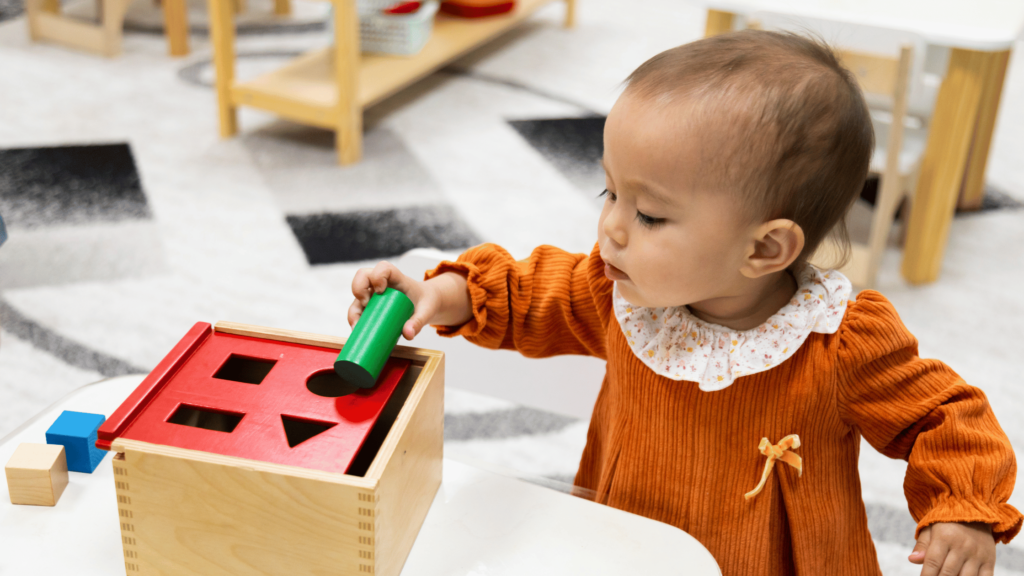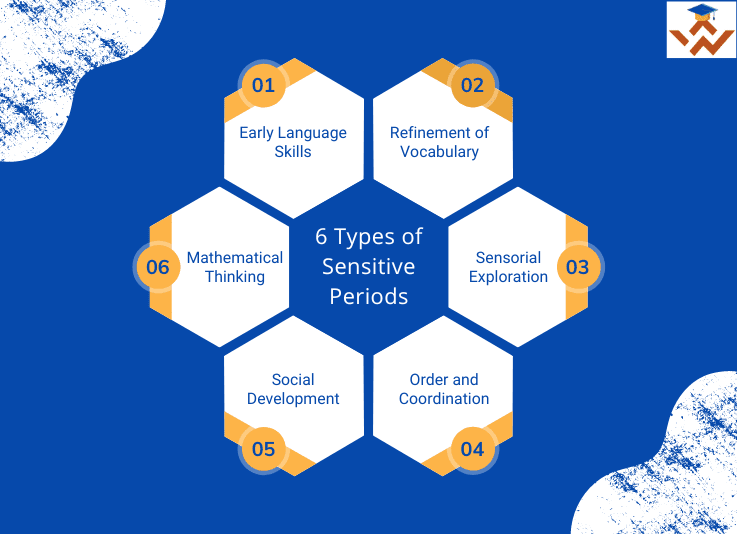Raising kids and helping them learn is like going on a special adventure where you need to understand all the cool things they’re learning. One really important thing to know about is “sensitive periods.” It’s like the secret code to how kids grow and learn in their own special way!
“The most important period of life is not the age of university studies, but the first one, the period from birth to the age of six. For that is the time when man’s intelligence itself, his greatest implement, is being formed.”- Maria Montessori
Maria Montessori introduced the concept of sensitive periods in the context of child development. She observed and documented that children go through specific stages of development during which they show heightened sensitivity and receptiveness to certain stimuli and experiences.
Recognizing and harnessing these periods can significantly impact your child’s overall development. In this article, we will explore what sensitive periods are, how to recognize them, the various types of sensitive phases in child development, and practical ways to guide children in the right direction during these critical times.
What Are Sensitive Periods?
Sensitive periods are biologically determined time frames during which a child’s brain is most receptive to specific stimuli. During these periods, a child is more likely to acquire certain skills and behaviors with ease and enthusiasm by passing through distinct stages of development and exhibit heightened sensitivity to particular experiences during each stage.
Maria Montessori once mentioned: “When dealing with children, remember that now is now and not a preparation for the future. The child is really a new being each day, a new creation.”
When I heard/ read about it, I started looking at things differently and started observing my daughter more vigilantly. Honestly, in my experience, it really helped me identify those periods and helped me in shaping the learning environment for her. Let us learn why I think it is important to learn about those periods and how to recognize them.
Why is it Important to Learn About Sensitive Periods?
- Optimal Learning: Recognizing my daughter’s sensitive period for language development opened up a world of possibilities. By surrounding her with books, engaging in conversations, and story telling, I witnessed her language skills flourish while conversing with her. Understanding her unique learning window allowed me to prepare and provide an environment to fulfill her desire to learn.
- Holistic Development Through Shared Experiences: My daughter showed a keen interest in order and coordination during his early years. Understanding this sensitive period allowed us to create a structured routine. This not only eased daily activities but also contributed to his sense of security and confidence.
- Individualized Support: My daughter’s sensitivity to language became apparent early on. Embracing this, we incorporated storytelling, music, and games into our daily routine. It not only enhanced her language skills but also fostered a love for creativity and expression. She is still young and keeps showing interest in various activities. We on the other hand provide enough materials to guide her during her learning journey.
- Early Intervention: When you see a child really wanting to do things on their own, like tying shoelaces or preparing the food for themselves, that’s their independence time. It’s not just about shoes or food; it’s about them feeling in charge. Letting them take on tasks that match their age during this time is like giving them a confidence boost and making them feel great about themselves. It’s like saying, “I see, you want to learn this skill, let me help you. You’ve got this!”
How to Recognize Sensitive Periods?
Spotting those sensitive periods in a child’s life is a bit like being a detective, tuning into their unique cues and interests. Here’s a closer look:
- Deep Focus: Watch for times when kids get super absorbed in something, their eyes light up, and they’re all in. That intense focus signals a sensitive period, a time when they’re super keen to dive deep into learning. It’s like they’ve found their learning love, and they’re passionate about exploring it.
- Repeat Mode: If you notice them doing the same activity repeatedly, it’s not just a random habit. It’s their way of saying, “I want to get really good at this!” Repetition during a sensitive period is their secret sauce for mastering a particular skill. Think of it as their training ground; each repetition is a step closer to mastering the skill they’re drawn to.
- Fast Learning: When kids are in a sensitive period, it’s like they’ve hit the fast-forward button on learning. Concepts and skills that might take longer to grasp suddenly become clear and easy for them. They’re like little learning superheroes, absorbing new stuff at a speed that might surprise you.
- Feeling All the Feels: Sensitive periods aren’t just about what they do; it’s also about how they feel. You might notice a heightened emotional response, whether it’s sheer joy from a breakthrough or a bit of frustration if things aren’t going as planned. Their emotions are like a guide, connected to what they’re into at the moment. It’s a sign that their heart is fully invested in this learning journey.
So, if you ever wonder about those learning sweet spots, just keep an eye out for these signs – the clues that tell you a sensitive period is in full swing!
What are 6 Types of Sensitive Phases in Child Development?
Maria Montessori during her study found that kids have special times when they’re super ready to learn certain things. Even though it’s a bit different for each child, these learning sweet spots usually happen during specific ages. Let’s learn about the six sensitive phases when kids are extra keen to pick up new skills!
- Early Language Skills: The sensitive period for language development begins in infancy and extends into the early years. During this time, children effortlessly absorb language way more than adults, making it the optimal period for exposing them to multiple languages if desired.
- Refinement of Vocabulary: Between ages two and six, kids are like language superheroes, extra tuned in to words and how they fit together. It’s the perfect time to surround them with talk-rich spaces and all kinds of communication styles.
“My daughter is right now in this phase, “From babbling to forming sentences, our daughter’s journey through the language-sensitive period has been incredible so far. We noticed her heightened curiosity for words around two years old. Reading together, exposing her to reading books and storytelling—it all contributed to her love for language and excellent communication skills.”
3. Sensorial Exploration: In a child’s early years, their sensitivity to touch, taste, smell, sight, and sound is more stronger and makes sensory learning essential. Engaging activities become explorations, laying the foundation for a lifetime of understanding through hands-on experiences.
“Watching my daughter explore the world through her senses during the early years was a joy. Sensory-sensitive periods are real! Activities like messy play, textured toys, thermal concept, and outdoor adventures enhanced her sensory development. It’s remarkable how much she absorbed during this time.”
4. Order and Coordination: Between the ages of one and three, children have a sensitive period for order and coordination. Providing a structured and orderly environment can support their need for predictability and routine during this developmental stage.
5. Social Development: Social sensitivity emerges around the age of three, signals a readiness for peer interactions. Encouraging positive social experiences and teaching essential social skills become crucial during this period.
6. Mathematical Thinking: The sensitive period for mathematical thinking typically occurs between the ages of four and six. Children are drawn to concrete materials that help them understand abstract mathematical concepts through hands-on experiences.
Guiding Children During Sensitive Periods
Understanding sensitive periods is essential, but guiding children through these phases is equally important. Here are practical tips for parents and educators:
- Observation: Pay close attention to a child’s interests and behaviours to identify their current sensitive periods. Observing the child’s interest in various environments helps to understand their preferences and reactions to stimuli.
- Provide Enriched Environments: Create environments that stimulate a child’s interests during sensitive periods. For example, if a child is inclined towards language, surround them with books, engaging conversations, and language-rich activities.
- Hands-On Learning: Facilitate hands-on learning experiences that align with the child’s current sensitive period. For instance, if a child is in a mathematical thinking phase, provide manipulative tools and activities that promote mathematical exploration.
- Encourage Independence: Foster independence and self-directed learning. Sensitive periods often coincide with a child’s desire to do things on their own. Offer age-appropriate tasks and activities that allow them to take initiative.
- Flexibility in Education: Recognize that sensitive periods may not align perfectly with traditional educational milestones. Be flexible in adapting educational approaches to meet the child’s unique developmental needs.
- Supportive Guidance: Offer gentle guidance and support without imposing rigid structures. Sensitive periods are times of exploration, and providing a supportive framework allows children to navigate these phases with confidence.
Conclusion
Understanding and recognizing sensitive periods in child development can greatly enhance the effectiveness of parenting and education. By tailoring experiences to match a child’s current developmental stage, parents and educators can create environments that nurture natural curiosity and skill acquisition. Embracing the concept of sensitive periods empowers adults to guide children through these critical windows of opportunity, laying the foundation for a lifelong love of learning and holistic development.





